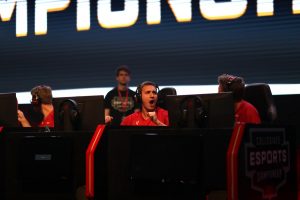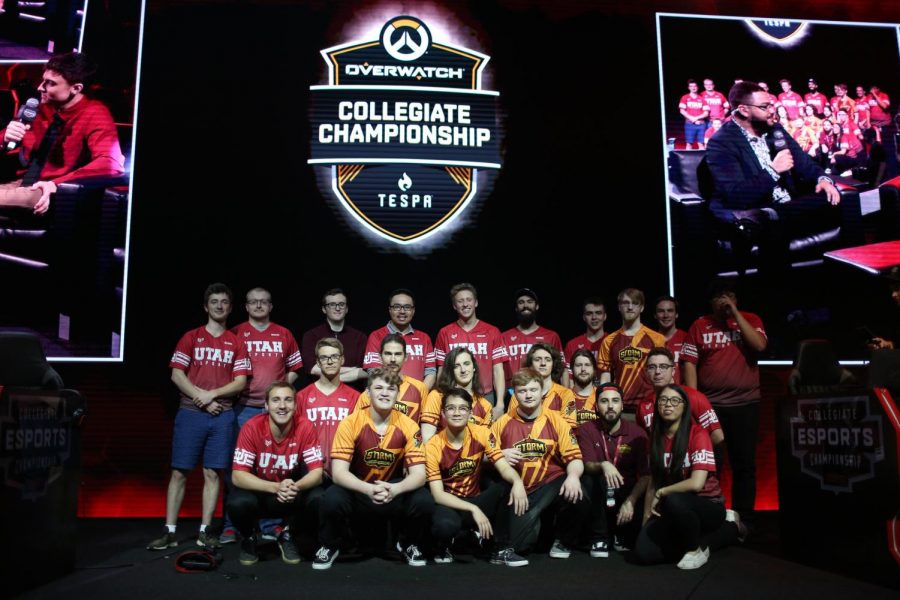University of Utah’s Varsity Esports Tryouts are Underway
August 29, 2019
Beyond the realm of buying, selling and playing games, there’s a world out there that’s growing massively: competitions for titles and prizes in televised and live-streamed competitive gaming tournaments. This is the world of esports. Millions of viewers tune in across platforms like YouTube, Twitch and even ESPN to watch professional gamers compete.
Esports Gaining Recognition
Controversies persist over whether professional gamers and their games can be considered equivalent to professional physical sports players and the non-virtual games they play. The objections to virtual competition are dwindling, however, with the consistent growth of the industry and an increasing recognition and respect for its entertainment. Globally, the esports industry has been growing at a rate of 36 percent annually and is predicted to generate anywhere from 1.8 to 3.2 billion dollars in the year 2022.
Epic Game’s Fortnite made headlines this year when a 16-year-old boy won the first World Cup solo event finals in New York. The winner, Kyle Giersdorf, took home $3 million, a larger prize pool than the 2018 Wimbledon Open or even Tiger Woods‘ winnings during the 2019 PGA Masters. In total, Epic Games brought together $100 million for the 2019 esports prize pool across all of their competitive tournaments.
Paving the Way in University Esports

The University of Utah has led the way in pushing the esports sector forward by sponsoring the first varsity esports program from any school in a Power Five athletics conference in 2017. A.J. Dimick, director of our university’s varsity esports program, said, “Collegiate esports [is] on a trajectory to having the same significance on college campuses as college football or basketball does.” With esports gaining popularity as the newest college sport, there are now over 160 colleges offering collegiate esports scholarships. Our university’s esports program is among the 94 percentile of college sponsored esports programs that make up the National Association of Collegiate Esports. As of 2018, the association has offered a total whopping $15 million in scholarships and aid to over 3,000 student athletes.
Game Design and Esports
Before the U’s Varsity Esports team began, the university was — and still is — one of the best schools for aspiring game designers. Both the undergraduate and graduate video game design programs have been ranked consistently among the top ten by the Princeton Review in recent years. These programs develop skills for making and studying games as a career. One undergraduate Bachelor of Science in Games degree was introduced only recently to phase out the old system of two distinct tracks, one through the Film and Media Arts program and the other through the Computer Science program.
With the U branding itself as a “GamerU,” it has created an explosion in the gaming world. By harnessing the best of both worlds — esports and game design — the university attracts students from around the world who love video games for their own unique reasons. As Dimick said, “Esports is run out of EAE because EAE was willing to take it on and thought it was important to students on campus that enjoy this content.”
Other colleges beginning their own collegiate esports teams have to start from the ground up, unlike the U. “EAE already had a foothold here and we were able to establish esports both bottom up from a grassroots student effort, but also with administrative support that had already been convinced that games is a part of the collegiate experience,” said Dimick.

The U Wants You
Going into their third year, the U’s varsity esports teams are conducting tryouts through late August and early September. There are four teams competing in the games “Overwatch,” “Hearthstone,” “Rocket League” and “League of Legends.” Register online at https://esports.utah.edu/tryouts/.
The U’s varsity esports tryouts are competitive. With the increasing popularity for the sport, these teams will be attracting more prospective players with fewer positions available. According to a 2018 Utah Business article, only 33 student athletes were accepted into the program out of 200 nationally. Dimick said, “There are a lot people that try out and figuring who makes the team is exactly like a sports team. You speculate not only on how good someone is but how good they can be, given resources, time and proper training.”
Future of Esports
It is without a doubt that esports are part of the future of gaming and entertainment. So far, the world of esports has proven itself with its growing popularity. Dimick said that esports are “simply the future of the kind of content this generation consumes and on platforms they are prevalent on.” Dimick went on to say, “Within the next five years, no student in the country will be able to imagine a world where collegiate esports did not exist.”











